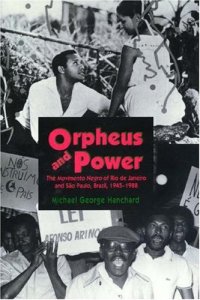
Ebook: Orpheus and Power: The Movimento Negro of Rio de Janeiro and Sao Paulo, Brazil 1945-1988
Author: Michael George Hanchard
"This book will be well received both because of the timeliness of the topic and the novel way in which it is treated. Virtually nothing exists in English that deals carefully with first-hand, participant accounts as this work does. It is also an intriguing development of Gramscian theory as applied to racial/ethnic identity, organization, and conflict."--Lowell Gudmundson, Mount Holyoke College From recent data on disparities between Brazilian whites and non-whites in areas of health, education, and welfare, it is clear that vast racial inequalities do exist in Brazil, contrary to earlier assertions in race relations scholarship that the country is a "racial democracy." Here Michael George Hanchard explores the implications of this increasingly evident racial inequality, highlighting Afro-Brazilian attempts at mobilizing for civil rights and the powerful efforts of white elites to neutralize such attempts. Within a neo-Gramscian framework, Hanchard shows how racial hegemony in Brazil has hampered ethnic and racial identification among non-whites by simultaneously promoting racial discrimination and false premises of racial equality. Drawing from personal archives of and interviews with participants in the Movimento Negro of Rio de Janeiro and Sao Paulo, Hanchard presents a wealth of empirical evidence about Afro-Brazilian militants, comparing their effectiveness with their counterparts in sub-Saharan Africa, the United States, and the Caribbean in the post-World War II period. He analyzes, in comprehensive detail, the extreme difficulties experienced by Afro-Brazilian activists in identifying and redressing racially specific patterns of violation and discrimination. Hanchard argues that the Afro-American struggle to subvert dominant cultural forms and practices carries the danger of being subsumed by the contradictions that these dominant forms produce.
Download the book Orpheus and Power: The Movimento Negro of Rio de Janeiro and Sao Paulo, Brazil 1945-1988 for free or read online
Continue reading on any device:

Last viewed books
Related books
{related-news}
Comments (0)